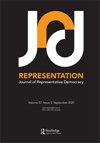比例代表制对选举立法的影响——来自新西兰的证据
Q2 Social Sciences
引用次数: 0
摘要
人们普遍认为,政治家是自私的,他们希望选举规则有利于他们的连任。虽然选举制度改革中的党派之争是众所周知的,但影响党派操纵其他民主“游戏规则”的因素——包括选举管理、选举权法和竞选资金——迄今为止却很少受到关注。新西兰是迄今为止唯一一个从非比例选举制度转向比例选举制度的老牌民主国家,因此提供了一个理想的案例来测试选举制度变化对选举改革政治的影响。本文考察了1970年至1993年在简单多数制下以及1997年至2020年在混合比例代表制下通过的党派和复员选举改革。虽然投票限制已经变得不那么普遍,但向比例制的转变并没有减少党派选举立法的数量。这些结果应该提醒人们,不要认为改革一个国家的选举制度必然会限制那些在规范上不受欢迎的选举改革的通过。本文章由计算机程序翻译,如有差异,请以英文原文为准。
The Effects of Proportional Representation on Election Lawmaking: Evidence from New Zealand
ABSTRACT It is widely recognised that politicians are self-interested and desire election rules beneficial to their re-election. Although partisanship in electoral system reform is well-understood, the factors that affect partisan manipulation of other democratic ‘rules of the game’ – including election administration, franchise laws, and campaign finance – has received little attention to date. New Zealand is so far the only established democracy to shift from a non-proportional to a proportional electoral system and thus presents an ideal case to test the effects of electoral system change on the politics of election reform. This article examines partisan and demobilising election reforms passed between 1970 and 1993 under first-past-the-post and between 1997 and 2020 under mixed-member proportional representation. Moving to a proportional system has failed to diminish the amount of partisan election lawmaking, though voting restrictions have become less common. These results should caution against claims that reforming a country’s electoral system will necessarily curtail the passage of normatively undesirable election reforms.
求助全文
通过发布文献求助,成功后即可免费获取论文全文。
去求助
来源期刊

Representation
Social Sciences-Sociology and Political Science
CiteScore
3.50
自引率
0.00%
发文量
31
期刊介绍:
This change in scope follows two paths. Firstly, it seeks contributors who are interested in exploring the interface between democratic practice and theory. In particular, this focus seeks contributions that apply theoretical insights to actual examples of current practice. Secondly, while not neglecting the current focus of the journal, we would like to expand its international coverage so that the journal will offer our readers insights in the state of democracy worldwide.
 求助内容:
求助内容: 应助结果提醒方式:
应助结果提醒方式:


